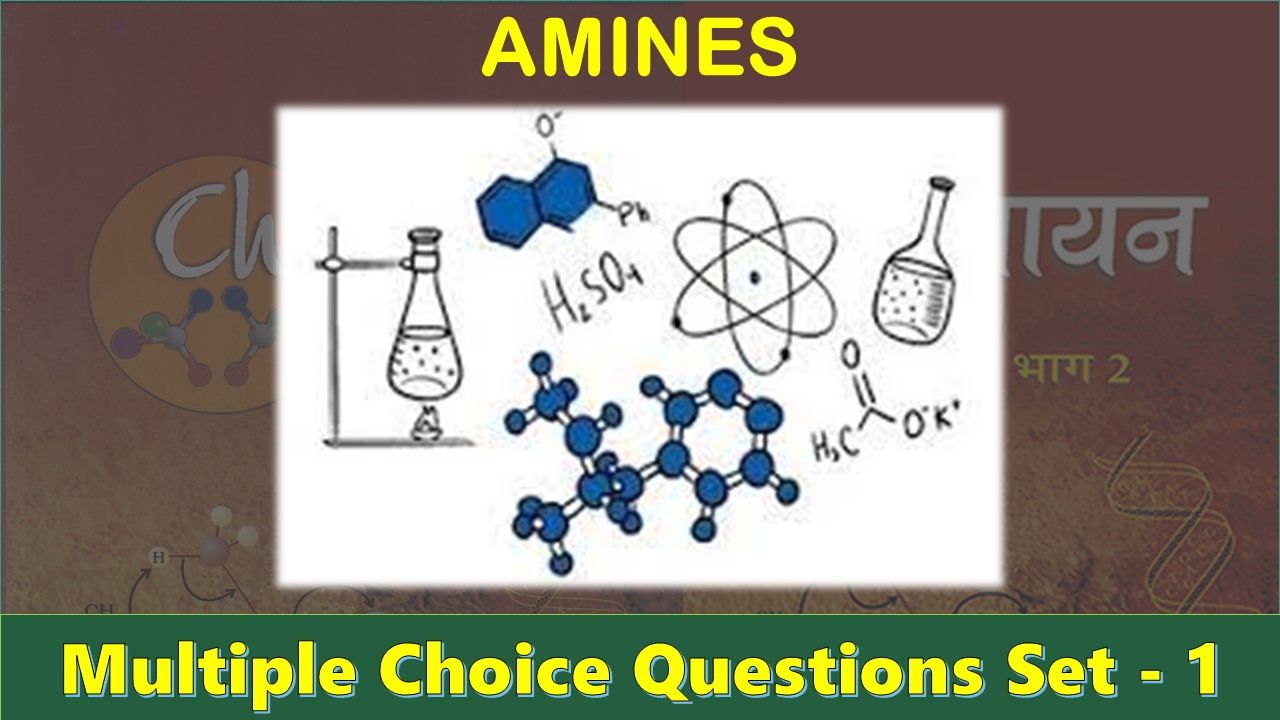CBSE Class 12 Amines with Answers Multiple Choice Questions with Answers. MCQ Questions Class 12 Amines with Answers with Answers Is Prepared Based on Latest Exam Pattern. Students can solve NCERT Class 12 Amines with Answers MCQs with Answers to know their preparation level.
Students who are searching for NCERT MCQ Questions for Class 12 Amines with Answers with Answers are compiled here to get good practice on all fundamentals. Know your preparation level on MCQ Questions for Class 12 Amines with Answers with Answers. You can also verify your answers from our provided MCQ Class 12 Amines with Answers with Answers. So, ace up your preparation with MCQ of Class 12 Chemistry Examinations.
MCQ Questions Class 12 Amines with Answers - Set - 1
Question 1:
The correct sequence of reactions to convert p-nitrophenol into quinol involves
(a) reduction, diazotisation and hydrolysis
(b) hydrolysis, diazotisation and reduction
(c) hydrolysis, reduction and diazotisation
(d) diazotisation, reduction and hydrolysis
Correct Answer – (A)
Question 2:
Which one of the following on reduction with lithium aluminium hydride yields a secondary amine?
(a) Methyl isocyanide
(b) Acetamide
(c) Methyl cyanide
(d) Nitroethane
Correct Answer – (A)
Question 3:
The electrolytic reduction of nitrobenzene in strongly acidic medium produces
(a) azobenzene
(b) aniline
(c) p-aminophenol
(d) azoxybenzene
Correct Answer – (C)
Question 4:
Nitrobenzene on reaction with conc. HNO3/H2SO4 at 80–100°C forms which one of the following products?
(a) 1, 4-Dinitrobenzene
(b) 1, 2, 4-Trinitrobenzene
(c) 1, 2-Dinitrobenzene
(d) 1, 3-Dinitrobenzene
Correct Answer – (D)
Question 5:
Which of the following will be most stable diazonium salt RN2+X –?
(a) CH3N2+X–
(b) C6H5N2+X–
(c) CH3CH2N2+X–
(d) C6H5CH2N2+X–
Correct Answer – (B)
MCQ Questions Class 12 Amines With Answers
Question 6:
Electrolytic reduction of nitrobenzene in weakly acidic medium gives
(a) N-phenylhydroxylamine
(b) nitrosobenzene
(c) aniline
(d) p-hydroxyaniline
Correct Answer – (C)
Question 7:
Acetamide is treated with the following reagents separately. Which one of these would yield methyl amine?
(a) NaOH-Br2
(b) Sodalime
(c) Hot conc.H2SO4
(d) PCl5
Correct Answer – (A)
Question 8:
Method by which aniline cannot be prepared is
(a) degradation of benzamide with bromine in alkaline solution
(b) reduction of nitrobenzene with H2/Pd in ethanol
(c) potassium salt of phthalimide treated with chlorobenzene followed by hydrolysis with aqueous NaOH solution
(d) hydrolysis of phenylisocyanide with acidic solution
Correct Answer – (C)
Question 9:
Aniline is reacted with bromine water and the resulting product is treated with an aqueous solution of sodium nitrite in presence of dilute hydrochloric acid. The compound so formed is converted into a tetrafluoroborate which is subsequently heated to dry. The final product is
(a) p-bromoaniline
(b) p-bromofluorobenzene
(c) 1, 3, 5-tribromobenzene
(d) 2, 4, 6-tribromofluorobenzene
Correct Answer – (D)
Question 10:
Which of the following reactions is appropriate for converting acetamide to methanamine?
(a) Hoffmann hypobromamide reaction
(b) Stephen’s reaction
(c) Gabriel phthalimide synthesis
(d) Carbylamine reaction
Correct Answer – (A)
- NCERT Solutions Class 11 Chemistry Chapter 1 : Some Basic Concepts of Chemistry
- NCERT Solutions Class 11 Chemistry Chapter 2 : Structure Of The Atom
- NCERT Solutions Class 11 Chemistry Chapter 3 : Classification of Elements and Periodicity in Properties
- NCERT Solutions Class 11 Chemistry Chapter 4 : Chemical Bonding and Molecular Structure
- NCERT Solutions Class 11 Chemistry Chapter 5 : States of Matter
- NCERT Solutions Class 11 Chemistry Chapter 6 : Thermodynamics
- NCERT Solutions Class 11 Chemistry Chapter 7 : Equilibrium
- NCERT Solutions Class 11 Chemistry Chapter 8 : Redox Reactions
- NCERT Solutions Class 11 Chemistry Chapter 9 : Hydrogen
- NCERT Solutions Class 11 Chemistry Chapter 10 : The s-Block Elements
- NCERT Solutions Class 11 Chemistry Chapter 11 : The p-Block Elements
- NCERT Solutions Class 11 Chemistry Chapter 12 : Organic Chemistry: Some Basic Principles and Techniques
- NCERT Solutions Class 11 Chemistry Chapter 13 : Hydrocarbons
- NCERT Solutions Class 11 Chemistry Chapter 14 : Environmental Chemistry




